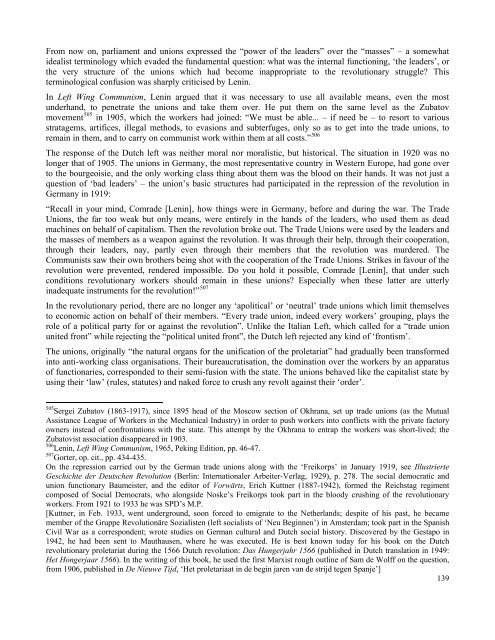The German-Dutch Communist Left - Libcom
The German-Dutch Communist Left - Libcom
The German-Dutch Communist Left - Libcom
You also want an ePaper? Increase the reach of your titles
YUMPU automatically turns print PDFs into web optimized ePapers that Google loves.
From now on, parliament and unions expressed the “power of the leaders” over the “masses” – a somewhat<br />
idealist terminology which evaded the fundamental question: what was the internal functioning, ‘the leaders’, or<br />
the very structure of the unions which had become inappropriate to the revolutionary struggle? This<br />
terminological confusion was sharply criticised by Lenin.<br />
In <strong>Left</strong> Wing Communism, Lenin argued that it was necessary to use all available means, even the most<br />
underhand, to penetrate the unions and take them over. He put them on the same level as the Zubatov<br />
movement 505 in 1905, which the workers had joined: “We must be able... – if need be – to resort to various<br />
stratagems, artifices, illegal methods, to evasions and subterfuges, only so as to get into the trade unions, to<br />
remain in them, and to carry on communist work within them at all costs.” 506<br />
<strong>The</strong> response of the <strong>Dutch</strong> left was neither moral nor moralistic, but historical. <strong>The</strong> situation in 1920 was no<br />
longer that of 1905. <strong>The</strong> unions in <strong>German</strong>y, the most representative country in Western Europe, had gone over<br />
to the bourgeoisie, and the only working class thing about them was the blood on their hands. It was not just a<br />
question of ‘bad leaders’ – the union’s basic structures had participated in the repression of the revolution in<br />
<strong>German</strong>y in 1919:<br />
“Recall in your mind, Comrade [Lenin], how things were in <strong>German</strong>y, before and during the war. <strong>The</strong> Trade<br />
Unions, the far too weak but only means, were entirely in the hands of the leaders, who used them as dead<br />
machines on behalf of capitalism. <strong>The</strong>n the revolution broke out. <strong>The</strong> Trade Unions were used by the leaders and<br />
the masses of members as a weapon against the revolution. It was through their help, through their cooperation,<br />
through their leaders, nay, partly even through their members that the revolution was murdered. <strong>The</strong><br />
<strong>Communist</strong>s saw their own brothers being shot with the cooperation of the Trade Unions. Strikes in favour of the<br />
revolution were prevented, rendered impossible. Do you hold it possible, Comrade [Lenin], that under such<br />
conditions revolutionary workers should remain in these unions? Especially when these latter are utterly<br />
inadequate instruments for the revolution!” 507<br />
In the revolutionary period, there are no longer any ‘apolitical’ or ‘neutral’ trade unions which limit themselves<br />
to economic action on behalf of their members. “Every trade union, indeed every workers’ grouping, plays the<br />
role of a political party for or against the revolution”. Unlike the Italian <strong>Left</strong>, which called for a “trade union<br />
united front” while rejecting the “political united front”, the <strong>Dutch</strong> left rejected any kind of ‘frontism’.<br />
<strong>The</strong> unions, originally “the natural organs for the unification of the proletariat” had gradually been transformed<br />
into anti-working class organisations. <strong>The</strong>ir bureaucratisation, the domination over the workers by an apparatus<br />
of functionaries, corresponded to their semi-fusion with the state. <strong>The</strong> unions behaved like the capitalist state by<br />
using their ‘law’ (rules, statutes) and naked force to crush any revolt against their ‘order’.<br />
505 Sergei Zubatov (1863-1917), since 1895 head of the Moscow section of Okhrana, set up trade unions (as the Mutual<br />
Assistance League of Workers in the Mechanical Industry) in order to push workers into conflicts with the private factory<br />
owners instead of confrontations with the state. This attempt by the Okhrana to entrap the workers was short-lived; the<br />
Zubatovist association disappeared in 1903.<br />
506 Lenin, <strong>Left</strong> Wing Communism, 1965, Peking Edition, pp. 46-47.<br />
507 Gorter, op. cit., pp. 434-435.<br />
On the repression carried out by the <strong>German</strong> trade unions along with the ‘Freikorps’ in January 1919, see Illustrierte<br />
Geschichte der Deutschen Revolution (Berlin: Internationaler Arbeiter-Verlag, 1929), p. 278. <strong>The</strong> social democratic and<br />
union functionary Baumeister, and the editor of Vorwärts, Erich Kuttner (1887-1942), formed the Reichstag regiment<br />
composed of Social Democrats, who alongside Noske’s Freikorps took part in the bloody crushing of the revolutionary<br />
workers. From 1921 to 1933 he was SPD’s M.P.<br />
[Kuttner, in Feb. 1933, went underground, soon forced to emigrate to the Netherlands; despite of his past, he became<br />
member of the Gruppe Revolutionäre Sozialisten (left socialists of ‘Neu Beginnen’) in Amsterdam; took part in the Spanish<br />
Civil War as a correspondent; wrote studies on <strong>German</strong> cultural and <strong>Dutch</strong> social history. Discovered by the Gestapo in<br />
1942, he had been sent to Mauthausen, where he was executed. He is best known today for his book on the <strong>Dutch</strong><br />
revolutionary proletariat during the 1566 <strong>Dutch</strong> revolution: Das Hungerjahr 1566 (published in <strong>Dutch</strong> translation in 1949:<br />
Het Hongerjaar 1566). In the writing of this book, he used the first Marxist rough outline of Sam de Wolff on the question,<br />
from 1906, published in De Nieuwe Tijd, ‘Het proletariaat in de begin jaren van de strijd tegen Spanje’]<br />
139
















